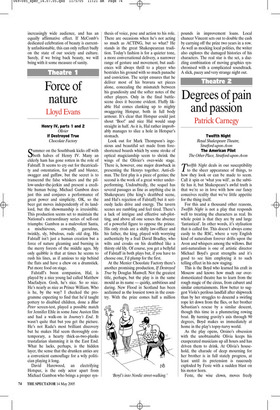Force of nature
Lloyd Evans
Henry IV, parts 1 and 2 Olivier If Destroyed True Chocolate Factory Summer on the Southbank kicks off with both halves of Henry IV. Many an elderly ham has gone rotten in the role of Falstaff. It seems to cry out for theatricality and ostentation, for puff and bluster, swagger and guffaw, but the secret is to transcend the false whiskers and the pillow-under-the-jerkin and present a credible human being. Michael Gambon does just this and conjures a performance of great power and simplicity. OK, so the beer gut moves independently of its landlord, but the showmanship is irresistible. This production seems set to maintain the National’s extraordinary series of sell-out triumphs: Gambon as a malevolent Santa, a mischievous, cowardly, garrulous, twinkly, sly, bibulous, rude old dog. His Falstaff isn’t just a human creation but a force of nature gleaming and burning in the merry forests of the middle ages. My only quibble is that at times he seems to rush his lines, as if anxious to nip behind the flats and have a chew on a drumstick. Put more food on stage.
Falstaff’s boon companion, Hal, is played by a nice young lad called Matthew Macfadyen. Gosh, he’s nice. So so nice. He’s nearly as nice as Prince William. Who is he, by the way? I checked the programme expecting to find that he’d taught pottery to disabled children, done a Blue Peter screen-test, played a possible match for Jennifer Ehle in some Jane Austen film and had a walk-on in Journey’s End. It wasn’t quite that but you get the picture. He’s not Rada’s most brilliant discovery but he makes Hal seem thoroughly contemporary, a hearty thick-as-two-planks trustafarian slumming it in the East End. What he lacks, perhaps, is the hidden layer, the sense that the drunken antics are a convenient camouflage for a wily politician playing it long.
David Harewood, an electrifying Hotspur, is the only actor apart from Michael Gambon who brings a proper syn thesis of voice, pose and action to his role. There are occasions when he’s not acting so much as ACTING, but so what? He stands in the great Shakespearean tradition. Today’s fashion is for a quieter tone, a more conversational delivery, a narrower range of gesture and movement, but audiences will always thrill to a player who bestrides his ground with so much panache and conviction. The script ensures that he deliver most of his bravura set pieces alone, concealing the mismatch between his grandiosity and the softer notes of the other players. Only in the final battlescene does it become evident. Fluffy likable Hal comes clanking up to mighty swaggering Hotspur, both in full body armour. It’s clear that Hotspur could just shout ‘Boo!’ and nice Hal would snap straight in half. As it is, Hal rather improbably manages to slice a hole in Hotspur’s stomach.
Look out for Mark Thompson’s ingenious and beautiful set made from foreshortened boards which by some stroke of optical magicianship seem to shrink the wings of the Olivier’s over-wide stage. There is, however, one major drawback in presenting the Henrys together. Anti-climax. The first play is a piece of genius; the second is the work of a great writer underperforming. Undoubtedly, the sequel has several passages as fine as anything else in Shakespeare (the king’s deathbed scene, and Hal’s rejection of Falstaff) but it seriously lacks drive and energy. The tavern scenes are rambling and feel tired. There’s a lack of intrigue and effective sub-plotting, and above all one senses the absence of a powerful figure to oppose the prince. His only rivals are a shifty law-officer and his father, the king, played with worrying authenticity by a frail David Bradley, who wilts and croaks on his deathbed like a thirsty old lily. Of course, you get a bellyful of Falstaff in both plays but, if you have to choose one, I’d plump for the first.
At the Menier Chocolate Factory there’s another promising production, If Destroyed True by Douglas Maxwell. Not the greatest title, perhaps, but the play is in the same mould as its name — quirky, ambitious and daring. New Flood in Scotland has been acclaimed as the lousiest town in the country. With the prize comes half a million pounds in improvement loans. Local chancer Vincent sets out to double the cash by carrying off the prize two years in a row. As well as mocking local politics, the writer also explores the damaged histories of his characters. The real star is the set, a dazzling combination of moving graphics synchronised with a complicated soundtrack. A slick, pacey and very strange night out.


































































 Previous page
Previous page